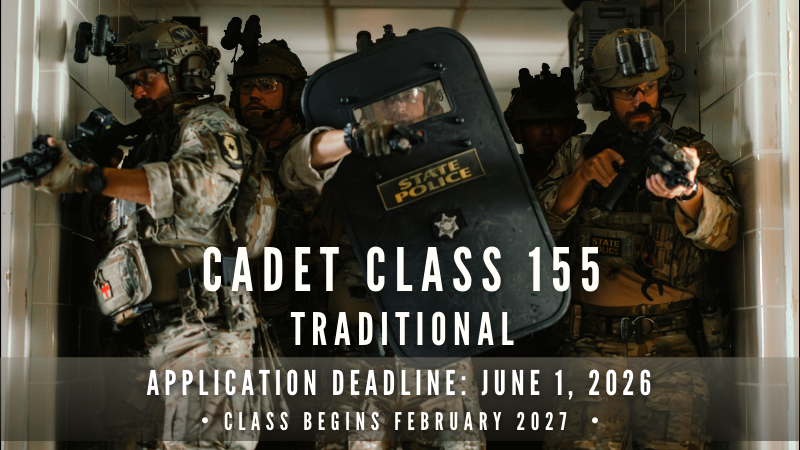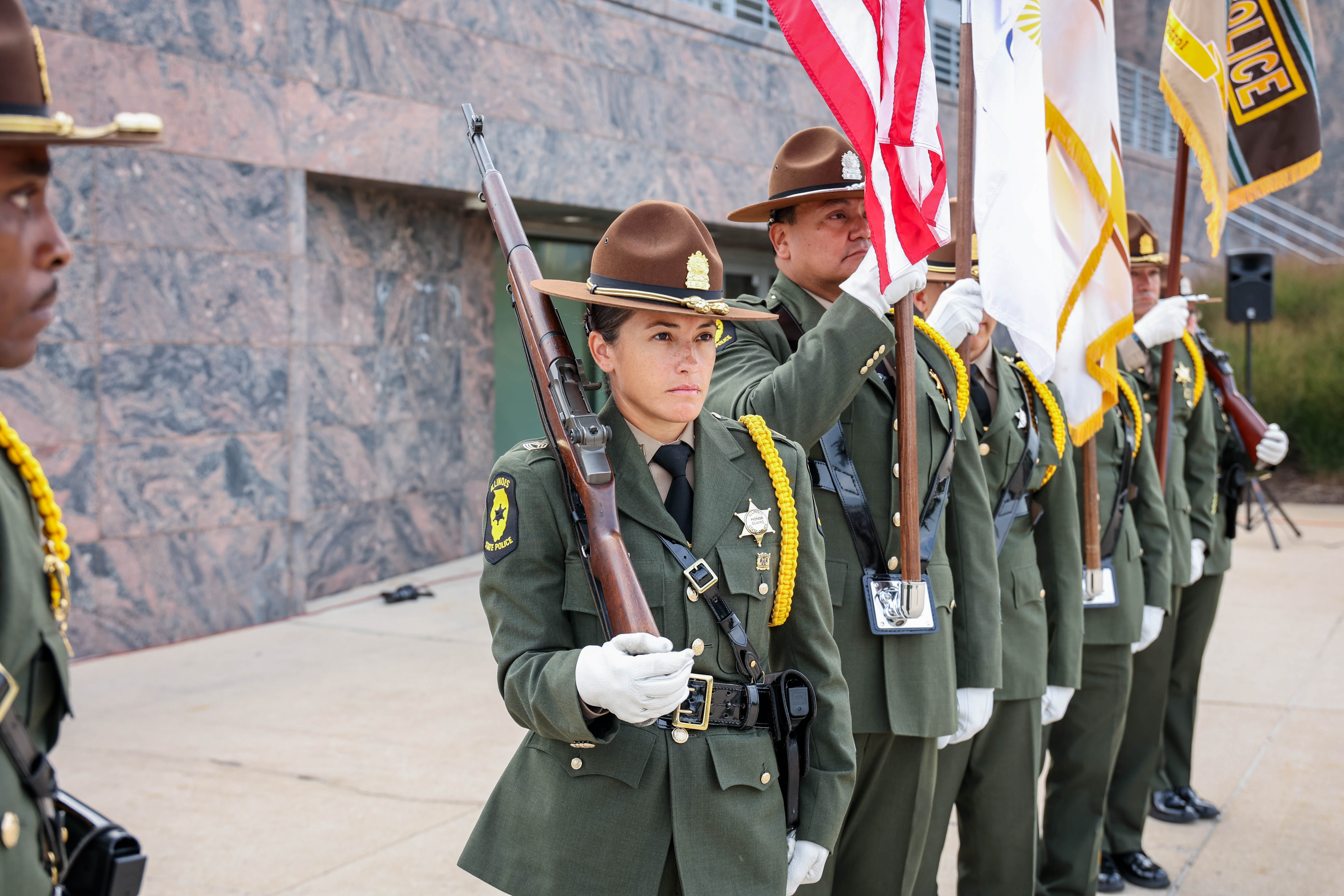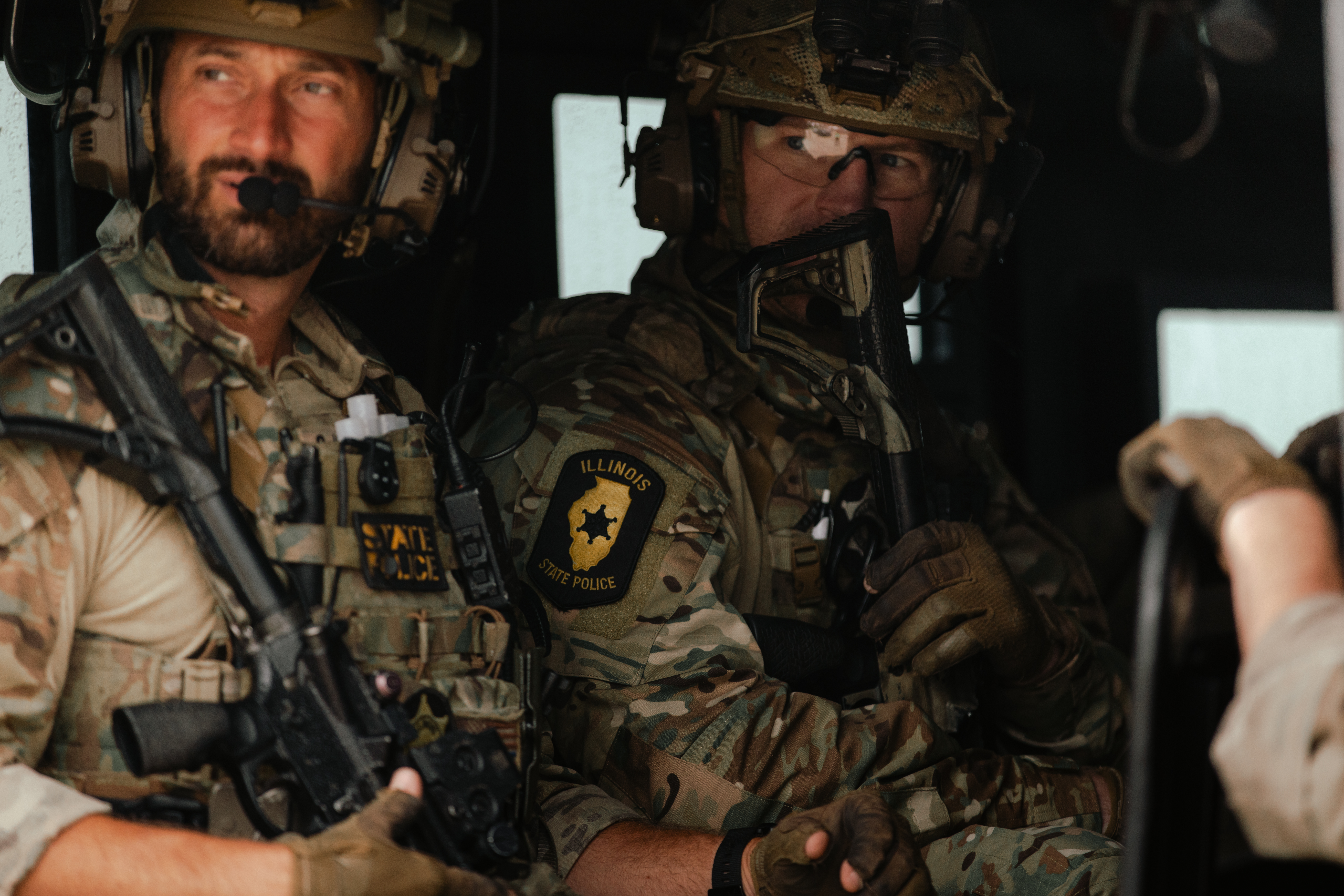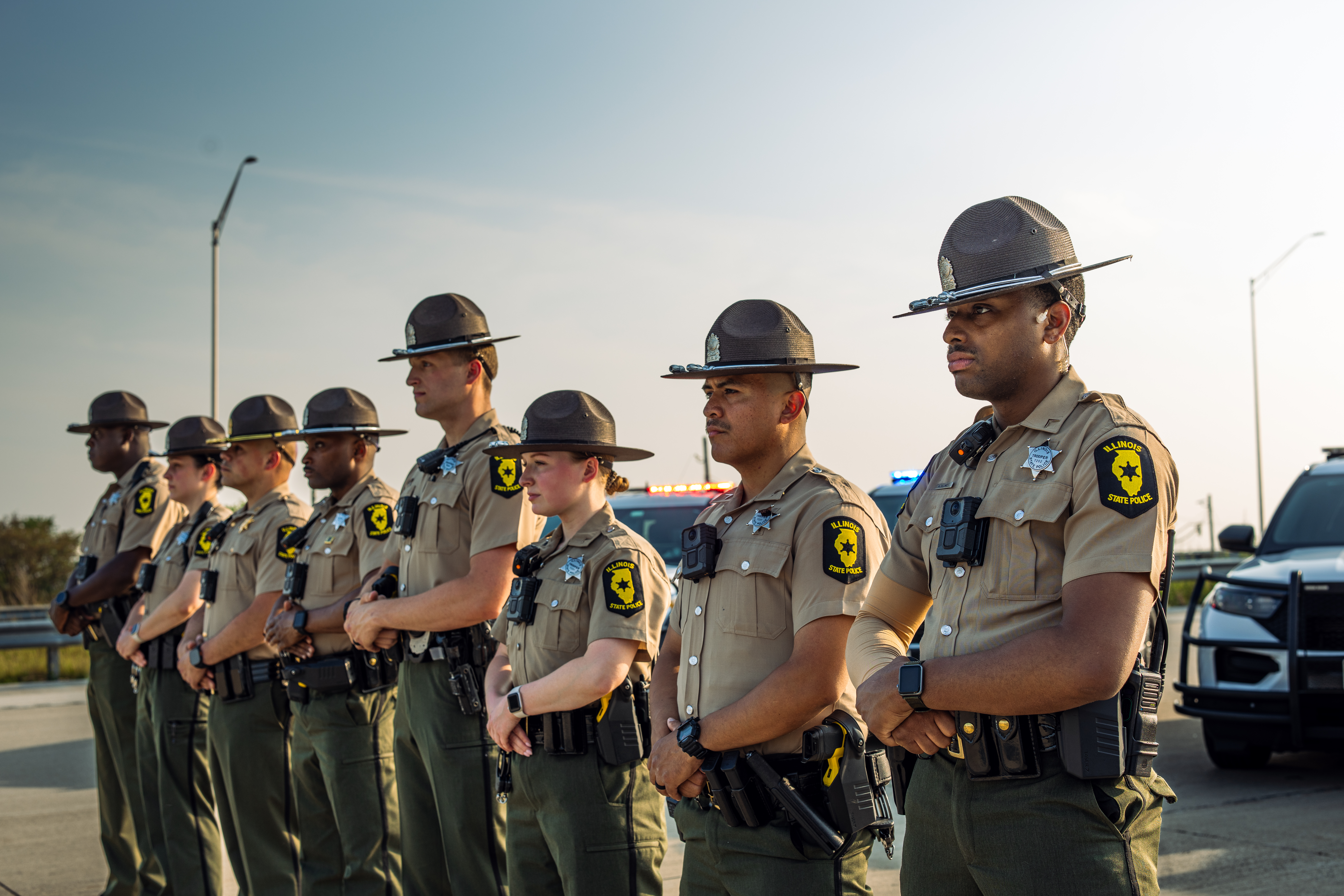
All requirements must be met prior to completing the online pre-employment application.
1. Must be twenty-one (21) years of age.
(An applicant twenty (20) years of age may apply if they have successfully completed an associates degree or 60 credit hours at a regionally accredited college or university.)
2. Cannot have been convicted of a felony.
3. Must be a citizen of the United States.
4. Must possess a valid driver's license.
5. Must be willing to accept an assignment anywhere in the State of Illinois.
6. Completed ONE of the following options:
OPTION ONE
Associate degree or at least 60 credit hours from an accredited college or university with at least a C average.
OPTION TWO
No education needed if applicant meets ONE of the following:- Honorably discharged AND awarded at least one of the qualifying medals by the United States Armed Forces.
- An active member of the Illinois National Guard or a reserve component of the United States Armed Forces AND been awarded at least one of the qualifying medals as a result of honorable service during deployment on active duty.
- Honorably discharged AND served in a combat mission by proof of hostile fire pay or imminent danger pay during deployment on active duty.
- Three years of full active and continuous United States Armed Forces duty, which also includes a period of active duty with the State of Illinois under Title 10 or Title 32 of the United States Code pursuant to an order of the President or the Governor of the State of Illinois, and received an honorable discharge.
OPTION THREE
No education needed if applicant meets ALL of the following at the time of application:- Has successfully completed basic law enforcement training
- Has at least three (3) years of continuous, full-time service as a peace officer with the same police department
- Is currently serving as a peace officer.
Accepted Accreditations
College or university must be accredited by one of the following:
• Middle States Commission on Higher Education
• Higher Learning Commission
• New England Commission of Higher Education
• Northwest Commission on Colleges and Universities
• Southern Association of Colleges & Schools Commission on Colleges
• WASC Senior College and University Commission Accrediting Commission for Community and Junior Colleges
PLEASE NOTE: Official, sealed transcripts will be required as proof.
Qualifying Military Medals:
• Southwest Asia Service Medal
• Kuwait Liberation Medal (Saudi Arabia)
• Kuwait Liberation Medal (Kuwait)
• Kosovo Campaign Medal
• Korean Defense Service Medal
• Afghanistan Campaign Medal
• Iraq Campaign Medal
• Global War on Terrorism Service Medal
• Global War on Terrorism Expeditionary Medal
• Inherent Resolve Campaign Medal
PLEASE NOTE: a DD-214 Long Form will be required as proof.
Foreign Degrees
The ISPMB rules require transcripts from a college or university accredited by one of the accrediting agencies listed in the Merit Board rules. Colleges or universities located outside the United States are not subject to accreditation by the agencies listed in the Merit Board rules.
To be deemed an acceptable applicant candidates must submit a credit evaluation from an organization that is a member of the National Association of Credit Evaluation Services (https://www.naces.org/members) or the Association of International Credentialing Evaluators (http://aice-eval.org/endorsed-members/), showing education is the equivalent to at least 60 credit hours. Candidates are responsible for the cost of the credit evaluation report.
Please contact the Merit Board's third-party vendor, IOS Recruitment, at recruitment@iosolutions.com or at 708-410-0200 for assistance with all Trooper application technical questions or issues.
SYNOPSIS OF HEARING STANDARDS FOR ENTRANCE INTO THE ILLINOIS STATE POLICE ACADEMY
The following hearing standards are an abbreviated version of those provided to the doctors who administer the hearing tests. Any significant finding or a finding that is not addressed by the standards listed below may be subject to additional testing and/or evaluated on an individual basis to determine the potential effects on the individual’s ability to perform the duties required of an Illinois State Trooper. If you have any questions or concerns with your hearing, we suggest you discuss these concerns with your personal doctor as the hearing screening is one of the last steps in the selection process.
HEARING: On audiometric testing, pure tone thresholds in the unaided worst ear, must not exceed 25 dB at 500 Hz, 1000 Hz, and 2000 Hz, and must not exceed 35 dB at 3000 Hz, or must not exceed 30 dB at any one of the first three frequencies with an average loss of no greater than 30 dB for all four frequencies. Cochlear implants and hearing aid use are not considered reasonable accommodations.
Questions regarding these requirements should be directed to the Illinois State Police at: ISP.CadetMedicals@illinois.gov.
SYNOPSIS OF VISUAL STANDARDS FOR ENTRANCE INTO THE ILLINOIS STATE POLICE ACADEMY
The following vision standards are an abbreviated version of those provided to the doctors who administer the vision tests. Any significant finding or a finding that is not addressed by the standards listed below may be subject to additional testing and/or evaluated on an individual basis to determine the potential effects on the individual’s ability to perform the duties required of an Illinois State Trooper. If you have any questions or concerns with your vision, or suspect color blindness, we suggest you discuss these concerns with your personal doctor as the vision screening is one of the last steps in the selection process.
FAR VISUAL ACUITY:
Uncorrected visual sharpness - minimum of 20/20 in one eye and no worse than 20/40 in the other eye. Corrected with spectacles or Rigid Gas Permeable Lenses – corrected acuity minimum of 20/20 in one eye and no worse than 20/40 in the other eye; uncorrected acuity must be no worse than 20/40 in either eye. Corrected with disposable or soft contact lenses – corrected acuity minimum of 20/20 in one eye and no worse than 20/40 in the other eye; no uncorrected acuity requirement; must have demonstrated successful contact lens use for the past four months without complication; must clean lenses on a regular basis and replace the lenses every 6-12 months or more frequently, if necessary.
NEAR VISUAL ACUITY:
Corrected near acuity must be no worse than 20/20 with both eyes open.
PERIPHERAL VISION:
Horizontal visual field must be ≥ 120 degrees in each eye. Total vertical field must be ≥ 100 degrees in each eye. Absence of large scotomas.
COLOR VISION:
Must be free of severe anomalous trichromacy, dichromacy, and monochromacy. Colored lenses to improve or correct color vision deficiencies are not allowed.
STEREOACUITY:
Candidates who test worse than 80 seconds of arc may be evaluated by a specialist to determine the reason for the deficit and determine if the candidate is at risk for double vision. Double vision/diplopia is disqualifying.
REFRACTIVE SURGERY:
There is a post-surgical wait time for all refractive surgery to allow vision to stabilize and ocular media to clear. Candidates with pre-op refractive errors up to 6.00 D spherical equivalent are subject to a three month post-surgical wait time after the following surgeries: Intrastromal Corneal Rings (ICR), Radial Keratotomy (RK), Photorefractive Keratectomy (PRK), Laser Keratomileusis (LASIK), and Laser Epithelial Keratomileusis (LASEK). Candidates with pre-op refractive errors over 6.00 D spherical equivalent are subject to a six month post-surgical wait time after the following surgeries: ICR, RK, LRK, LASIK, and LASEK. Candidates with Anterior Chamber-Phakic Intraocular Lenses (PIOL) require a six month post-surgical wait time. If any lens opacities/vacuoles/cataracts have developed, the wait time should extend an additional six months after the first appearance. Candidates with Posterior Chamber-PIOL require a twelve month post-surgical wait time. If any lens opacities/vacuoles/cataracts have developed, the wait time should extend an additional twelve months after the first appearance. Orthokeratology or any experimental refractive surgical procedures must be evaluated on an individual basis.
EYE HEALTH AND HISTORY:
Any eye disease or disorder in which the candidate meets all other vision standards may be subject to additional testing and/or evaluated on an individual basis to determine the potential effects on the individual’s ability to perform the duties required of an Illinois State Trooper.
>Questions regarding the medical, vision, or hearing requirements should be directed to the Illinois State Police at: ISP.CadetMedicals@illinois.gov.
MEDICAL & PSYCHOLOGICAL STANDARDS FOR ENTRANCE INTO THE ILLINOIS STATE POLICE ACADEMY
Questions regarding the medical, vision, or hearing requirements should be directed to the Illinois State Police at: ISP.CadetMedicals@illinois.gov.
Traditional cadets currently earn $4,290/monthly while attending the Illinois State Police Academy. Upon successful completion of the Academy, the Trooper's salary is increased to $7,313 per month.
Lateral Cadets will receive Trooper 1 pay ($7,313/month) while attending the Illinois State Police Academy.
Pay scale beginning 7/1/2025:
Years of Service - Salary
1 Year - $87,756
5 Years - $96,168
10 Years - $111,552
15 Years - $123,024
20 Years - $134,316
25 Years - $148,152



PHYSICAL FITNESS REQUIREMENTS
Learn more about the Physical Fitness Inventory Test ("PFIT").
Learn more
CONNECT WITH A RECRUITER
Connect with an ISP Recruiter to learn more about the career of a Trooper.
Learn more
HOW DO I BECOME A TROOPER?
Learn more about the process to become an Illinois State Trooper.
Learn more
NOTE: The Applicant Process procedures are subject to change at any time.
